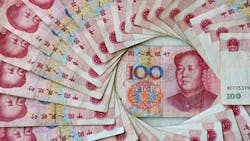US Stops Short of Labeling China a Currency Manipulator
WASHINGTON - The U.S. Treasury said Wednesday that the Chinese yuan remains undervalued despite its significant appreciation this year and called on Beijing to disclose more about its market intervention.
In a semi-annual report to Congress, the Treasury stopped short of officially labeling China a currency manipulator, a designation that could spark U.S. trade sanctions.
The yuan, or renminbi (RMB), "is appreciating, but not as fast or by as much as is needed," the Treasury said.
"In line with the practice of most other G20 nations, China should disclose foreign exchange market intervention regularly to increase the credibility of its monetary framework and to promote exchange rate and financial market transparency," it said.
The Treasury also singled out Japan and South Korea for undervalued currencies.
But it acknowledged that Tokyo has not intervened in foreign exchange markets for almost two years, and that the yen's fall came from the government's stimulus.
As for the Korean won, it said market participants estimate Seoul had intervened in early 2013 to hold down the currency as the yen weakened and continued to intervene through the middle of the year.
The yuan rose 6.3% on a trade-weighted basis in the first nine months of this year, more than the other currencies covered in the Treasury report.
Yuan Rises 2.2% Against U.S. Dollar
But the Treasury tied that to the fall of the Japanese yen against most major currencies. Meanwhile, against the U.S. dollar, the yuan only rose 2.2%.
It cited data from the International Monetary Fund in July saying the yuan was undervalued by 5% to 10% against a broad basket of currencies.
It said China's large-scale purchases of foreign exchange this year, driving its reserves to $3.6 trillion, "is suggestive of actions that are impeding market determination and a currency that is significantly undervalued."
As regards Japan and South Korea, the Treasury report was more measured than the previous one in April, when both were warned against weakening their currencies to gain trade advantage.
The Treasury said it will "continue to closely monitor Japan's policies and the extent to which they support the growth of domestic demand."
The Treasury said that the Korean won remained undervalued by 2% to 8%, according to IMF data, and noted that Seoul had amassed $326 billion in foreign exchange reserves, more than it needs.
"We will continue to encourage Korean authorities to limit foreign exchange intervention to the exceptional circumstances of disorderly market conditions," it said.
In addition, in line with the practice of most other G-20 countries, Korea should disclose foreign exchange market intervention shortly after it takes place."
Copyright Agence France-Presse, 2013
About the Author
Agence France-Presse
Copyright Agence France-Presse, 2002-2025. AFP text, photos, graphics and logos shall not be reproduced, published, broadcast, rewritten for broadcast or publication or redistributed directly or indirectly in any medium. AFP shall not be held liable for any delays, inaccuracies, errors or omissions in any AFP content, or for any actions taken in consequence.
